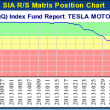by David Merkel, Aleph Blog
If you are a money manager, you would like to be in the top quartile of managers all of the time, but you know that is virtually impossible. So you might set a more achievable goal, staying out of the bottom quartile. Now there are two ways to achieve that:
1) Make intelligent asset selections that outperform your competition.
2) Own an index-like portfolio that has low odds of slipping into the fourth quartile.
Now, which of those do you think is easier? Right, #2. Which do most money managers adopt? Right again, #2. Charge active management fees for a portfolio that will not perform much different from the index.
I take route #1 for several reasons.
1) If I am charging a fee for active management, I find it unethical to try to hug the index.
2) I am willing to look bad for a year or two, if I believe that my methods will outperform over time, reduce risk, etc.
3) My focus on “margin of safety” keeps me out of the fourth quartile anyway. I rarely take large losses on a given stock, even though I do not automatically sell stocks after a certain level of loss.
4) If you look hard enough, and are willing to try assets that have issues, but with adequate safety, you can do pretty well.
I would encourage you to look for managers that have a large active share — that is, those that are very different from the index, but with a record of doing well.
Understand the asymmetry of interests between managers and clients. You pay fees; they receive fees. Thus, look for managers that have a large proportion of their liquid net worth invested in the assets that they manage. That imposes a discipline that makes them fight for themselves as well as their clients. At present, I am still my firm’s largest client, with over 80% of my liquid net worth invested in my strategies.
If your active investments underperform over long periods of time, and you don’t know where to look, consider an ETF or index fund in the same area. My view is to look for managers that successfully take risk over time, and run portfolios that do not look index-like.
An Aside
As for me and my clients, increasingly the portfolio has become global. My portfolios don’t have a limit on non-US exposure. As I have selected assets the last few times, foreign assets have offered better opportunities than domestic. Maybe that implies something regarding US stock overvaluation, and maybe not.
From my angle, many foreign markets seem cheap, even if things don’t seem that great now. Regardless, I buy what seems to be best, and if I end up with an entirely foreign portfolio, so be it. I don’t aim for that, but if that is what is on sale, I will buy.
Copyright © David Merkel, Aleph Blog











